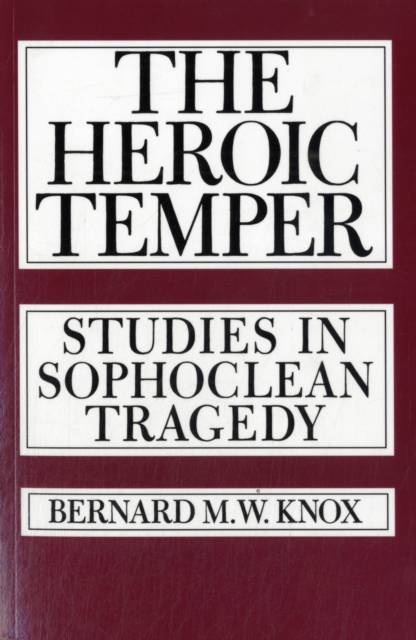
Bedankt voor het vertrouwen het afgelopen jaar! Om jou te bedanken bieden we GRATIS verzending (in België) aan op alles gedurende de hele maand januari.
- Afhalen na 1 uur in een winkel met voorraad
- In januari gratis thuislevering in België
- Ruim aanbod met 7 miljoen producten
Bedankt voor het vertrouwen het afgelopen jaar! Om jou te bedanken bieden we GRATIS verzending (in België) aan op alles gedurende de hele maand januari.
- Afhalen na 1 uur in een winkel met voorraad
- In januari gratis thuislevering in België
- Ruim aanbod met 7 miljoen producten
Zoeken
Omschrijving
The first two chapters of this book isolate and describe the literary phenomenon of the Sophoclean tragic hero. In all but one of the extant Sophoclean dramas, a heroic figure who is compounded of the same literary elements faced a situation which is essentially the same. The demonstration of this recurrent pattern is made not through character-analysis, but through a close examination of the language employed by both the hero and those with whom he contends. The two chapters attempt to present what might, with a slight exaggeration, be called the "formula" of Sophoclean tragedy.
A great artist may repeat a structural pattern but he never really repeats himself. In the remaining four chapters, a close analysis of three plays, the Antigone, Philoctetes, and Oedipus at Colonus, emphasizes the individuality and variety of the living figures Sophocles created on the same basic armature.
This approach to Sophoclean drama is (as in the author's previous work on the subject) both historical and critical; the universal and therefore contemporary appeal of the plays is to be found not by slighting or dismissing their historical context, but by an attempt to understand it all in its complexity. "The play needs to be seen as what it was, to be understood as what it is."
A great artist may repeat a structural pattern but he never really repeats himself. In the remaining four chapters, a close analysis of three plays, the Antigone, Philoctetes, and Oedipus at Colonus, emphasizes the individuality and variety of the living figures Sophocles created on the same basic armature.
This approach to Sophoclean drama is (as in the author's previous work on the subject) both historical and critical; the universal and therefore contemporary appeal of the plays is to be found not by slighting or dismissing their historical context, but by an attempt to understand it all in its complexity. "The play needs to be seen as what it was, to be understood as what it is."
Specificaties
Betrokkenen
- Auteur(s):
- Uitgeverij:
Inhoud
- Aantal bladzijden:
- 224
- Taal:
- Engels
- Reeks:
- Reeksnummer:
- nr. 35
Eigenschappen
- Productcode (EAN):
- 9780520049574
- Verschijningsdatum:
- 4/05/1983
- Uitvoering:
- Paperback
- Formaat:
- Trade paperback (VS)
- Afmetingen:
- 137 mm x 208 mm
- Gewicht:
- 254 g

Alleen bij Standaard Boekhandel
+ 108 punten op je klantenkaart van Standaard Boekhandel
Beoordelingen
We publiceren alleen reviews die voldoen aan de voorwaarden voor reviews. Bekijk onze voorwaarden voor reviews.









